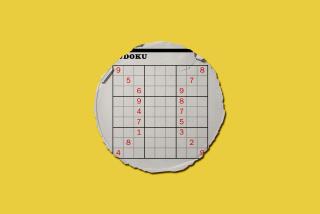For True Crossword Addicts, This Club Delivers : Pastimes: Five games a month are mailed to 67,000 members across the nation. Organization was designed for those who crave more than a once-a-week fix.
- Share via
OLD SAYBROOK, Conn. — What’s a four-letter word for a seed covering? A five-letter word for rose perfume? The proper name for an eagle’s nest?
If you know the answers immediately, chances are you’re a crossword puzzle maven--the perfect candidate for a club that boasts 67,000 subscribers nationwide.
The Crosswords Club, which operates out of a small office in this elite coastal suburb, is made for people who can reel off words like aril, attar and aerie--the answers to the clues above.
It’s for people who first open their newspapers to the crosswords page and feel a mixture of satisfaction and melancholy when the daily challenge has been met and all the little boxes are filled in.
“Our members are upscale, well-educated, affluent--and they usually have a lot of leisure time,” says club president Paula Strobel.
Membership in the club costs $30--$45 for large-type puzzles--and includes a mailing of five original puzzles each month. The puzzles are the same size and level of difficulty as those appearing each Sunday in the New York Times Magazine, Strobel said.
They are edited, in fact, by Will Weng, editor of the Times’ puzzles from 1969 to 1977, and a legend in crossword circles.
Weng, now 84, has been involved in the club since it began in 1981, the brainchild of two couples vacationing together on Nantucket.
Jonis and Kathryn Gold were house guests of Nob and Michele Hovde, and the four were spending a Sunday afternoon together on the beach, reading the Times. There were two crossword puzzle lovers--Michele Hovde and Jonis Gold--but, alas, only one copy of the coveted puzzle.
“I have never done a puzzle in my life, and my wife is addicted to them,” Hovde said. “My wife was invoking her rights as the hostess, he was invoking his rights as the guest, and I thought, ‘My God, these people are almost serious in their arguments.’ ”
It was that element of seriousness, that desperation for the weekly fix, that sparked the idea.
“The four of us got to talking,” Hovde said, “and I said, ‘Wouldn’t it be nice if on Wednesdays--midweek--the addicted could receive a special puzzle in the mail?’ ”
The couples soon realized that sending out puzzles weekly would be too expensive, but they liked the idea of giving crossword lovers more puzzles than they could get in the newspapers.
And who better to recruit as puzzles editor than Weng, who had--fortuitously--recently retired from the Times?
The group placed their first advertisement in October, 1981, in time for holiday gift-giving. They hoped to get 1,500 membership orders and thus break even--and were stunned by the 5,000 responses that flooded in, Hovde said.
“That was without a doubt the worst Christmas of our lives,” he said. “We were completely overwhelmed.”
Before long, what was intended as somewhere between a hobby and a cottage industry became big business, Hovde said.
The partners opened offices in Westchester, N.Y., and hired a staff to fill orders. After a while, more to preserve a longstanding friendship than because of any problems, the Hovdes bought out the Golds. But in 1985, the couple decided they wanted to travel and enjoy themselves.
Strobel and a partner, then the club’s managers, bought the Hovdes out, and Strobel became sole owner in 1988.
The club’s membership has grown rapidly over the years, even though it has tapped into only a small fraction of the estimated 30 million Americans who do crossword puzzles, Strobel said.
What makes crossword puzzles appealing to so many?
“I think it’s because it’s a pure pastime,” Weng said. “For bridge, you need partners and you need to choose a time to get together. A puzzle you can pick up and it has no continuity. You can put a puzzle away for a month and pick it up where you left it.”
As the club’s editor, Weng chooses the best puzzles provided by puzzle constructors, the people who actually design the crosswords. A good puzzle, he said, depends not just on clever clues and answers but on an original, over-arching theme.
“All puzzles should have subject matter--maybe puns on various things like foods or a little outlook on life that is different,” he said.
Finding the increasingly elusive original theme, veteran puzzle constructor Frances Hansen said, is the most difficult part.
Hansen, 72, of Metuchen, N.J., particularly likes making up her own verses.
In a recent club puzzle, titled “Small Wonder,” her clues led readers to the lines: “Tom Thumb Was Highly Paid, But Here’s the Grim Report, Despite the Dough He Made, Poor Tom Was Always Short.”
She also likes puns, such as the one she used in a St. Patrick’s Day puzzle. The clue was “Treating an Irish friend to a drink.” The answer? “Standing Pat.”
But she’s a little worried that crosswords may not appeal to the younger generation.
“A lot of the younger people, they’re working all day and when they go home, they’re too tired or too busy to sit down and do a puzzle,” she said. “But if you get into the habit, you never stop doing them.”
(People interested in subscribing can write to the Crosswords Club, P.O. Box 635, Old Saybrook, Conn. 06475, or call 800-874-0430.)



